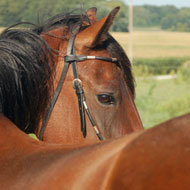
Charity's call ahead of review findings
World Horse Welfare is calling on Defra to introduce micro-chipping for all horses when it announces the findings of its review of the passport system next month.
The review follows last year's food scandal in which horsemeat was found in beef products.
The charity says that the law at the moment only requires horses born after 2009 to be micro-chipped, leaving hundreds of older horses untraceable.
A report by World Horse Welfare and other charities also found that in England and Wales, increased breeding coupled with a decrease in the value of horses, meant that some 6,500 horses are at risk of abandonment or neglect, while some are being sold for as little as £5.
World Horse Welfare has been working with Defra to develop changes to the law to ensure against a repeat of the scandal but says Defra and the European Commission, may be "reluctant" against a move to microchip all horses.
"Tightening to the laws on equine identification – or 'horse passports' – and planning to reintroduce a central database are vital steps forward, but there is a risk that the new laws will not go far enough to ensure a workable, enforceable system," said Roly Owers, chief executive of World Horse Welfare.
"We are urging the European Commission and Defra to take the opportunity afforded by the horse meat scandal to do it right this time around."
The charity said it had been highlighting problems with the horse passport system for a number of years before last year's meat scandal broke.
It has also called for CCTV to be mandatory inside all equine slaughterhouses in Britain following abuse of horses at an English abattoir early last year. A petition of more than 40,000 names has been handed in to Defra calling for mandatory CCTV, although Defra is not said to be in favour of the move.



 The RCVS has announced a new version of its 1CPD mobile app, with enhanced features for veterinary surgeons and veterinary nurses to record their continuing professional development.
The RCVS has announced a new version of its 1CPD mobile app, with enhanced features for veterinary surgeons and veterinary nurses to record their continuing professional development.